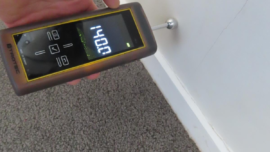
Why You Should Have A Moisture & Mould Inspection
Why You Should Have A Moisture & Mould Inspection
A lot of people are underestimating the damage water can cause to their home, or the extent of expensive repairs they may have to undertake down the line. Many also fail to realize how easily preventable these problems are if regular inspections and maintenance are carried out on the property.

Prolonged dampness can lead to indoor mould growth (fungal) and create a conducive environment for termites and timber pests. Mould exposure can also lead to severe human health effects, especially for people with asthma or a mould allergy
What can cause a high moisture reading?
There are several ways water and moisture can enter your home. If it’s a result of a persistent downpour, most commonly it will be seeping through the basement floor. Hence this is the first place you should inspect for moisture.
However, other common areas creating excess wetness and steam include the bathroom and the kitchen – showering and cooking frequently adds moisture to the air in your home.
Wet spaces in your home are particularly vulnerable to water damage and need to be regularly inspected for mould growth. You need to find the source of moisture, eliminate it and make sure you remove all the mould and mould spores.
In the bathroom, mould on wall sheeting, ceiling tiles and flooring may be caused by poor waterproofing or leaking taps, pipes or by fault of plumbing leaks. These issues can all cause significant water damage to cabinets and floors.
During an inspection, you should always pay specific attention to areas underneath shelving and inside cupboards as well as along the wall skirting. These are areas where signs of overflows or mould build-up from leaks can go unnoticed.
Untreated mould and dampness can damage wood in form of either stains or growths. In worse cases, it can contribute to more serious decay and cause irreversible damage to hardwood floors, window-frames, and other wooden fittings.
There are also causes that might not be so obvious to people. These include poor ventilation, inadequate insulation, contaminated air-conditioning system and poor building practices or low-quality building materials.
How to control & prevent moisture in your home
You should make it a habit to check for any presence of mould. You can do this by checking your roof for any roof leaks and the brickwork after wet and stormy weather. This will ensure water is not getting in through any new leaks. You should also regularly check on your ventilation throughout your home and possible sources of moisture.
Adequate ventilation is crucial in controlling humidity and in increasing indoor air quality. It might be as easy as letting out trapped moisture through opening a window or turning the fans or aircon on. This is especially important in wet rooms and during particularly hot and humid months. Investing in a good quality humidifier is also a good remedy for trapped moisture.
If water is in fact entering your home from the outside, you may have to spend some time on simple landscaping to prevent further damage. If the leak is extensive, you might have to hire someone to do some professional waterproofing.
For smaller issues, put a plastic cover over dirt in crawlspaces to prevent moisture from coming in from the ground.
When should you have a moisture reading and mould inspection?
At Dependable House Inspections, our qualified building inspectors always check for signs of elevated moisture during a building inspection.
Even though yearly inspections are highly recommended, there are other occasions where you might want to call in professionals between regular visits for peace of mind.
For example:
- You had a mould issue in the past and are not sure it’s completely gone.
- Your home has endured extra wet and story weather lately.
- You recently bought a new home or thinking about buying a particular home.
- To determine how “bad” the problem is.
- You bought second-hand or antique furniture (often carries mould).
- You are experiencing mould-related health symptoms like asthma attacks or skin irritation from contact with mould.
In case you find yourself in any of the above circumstances, get in touch with us and let’s see what we can help you with.
about dependable house inspections
Dependable House Inspections offers professional, comprehensive construction advice and reports on residential properties to ensure your complete peace of mind – whether you are purchasing, renovating or developing a property.
We will empower your negotiations and help you make the right property decision – with 30 years of building experience, we are working for you to ensure that you fully understand the complete picture when it comes to your new property.
Get in touch with us today to get your report prepared.
Alternatively, call us on 0800 337 373 for a quick response.





